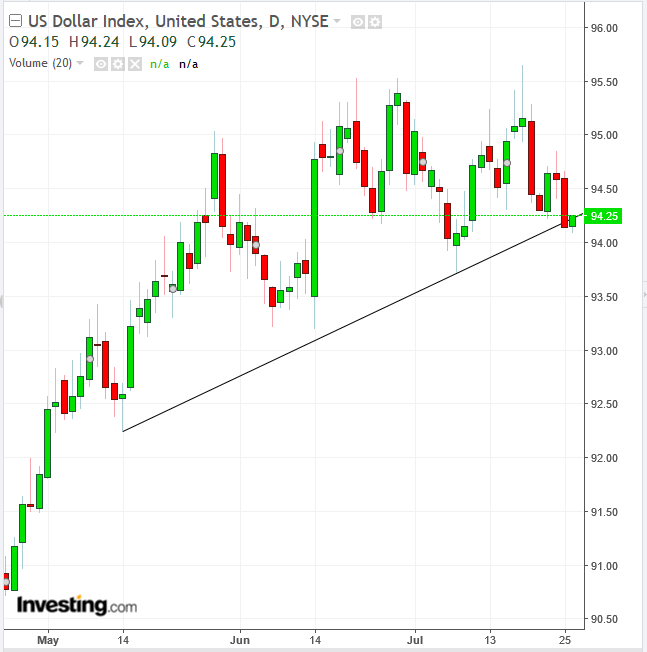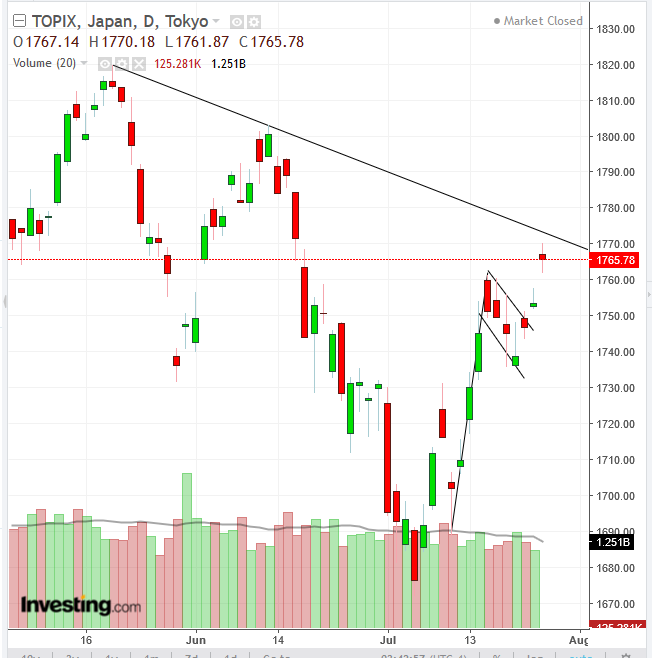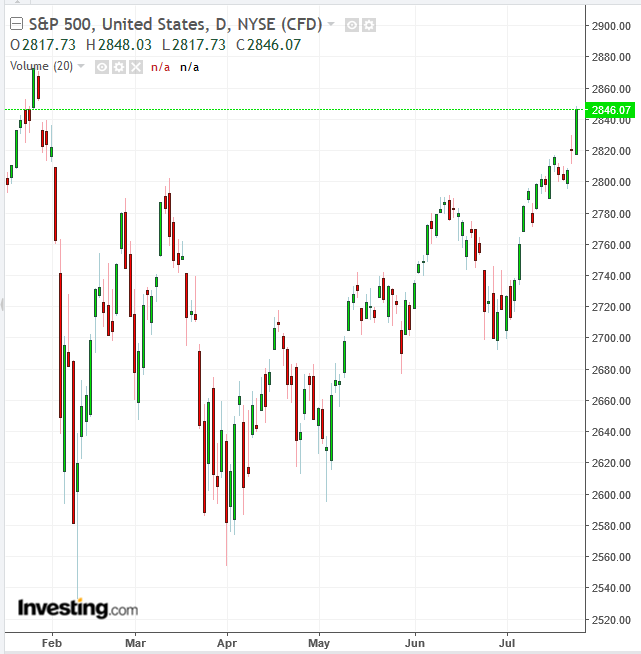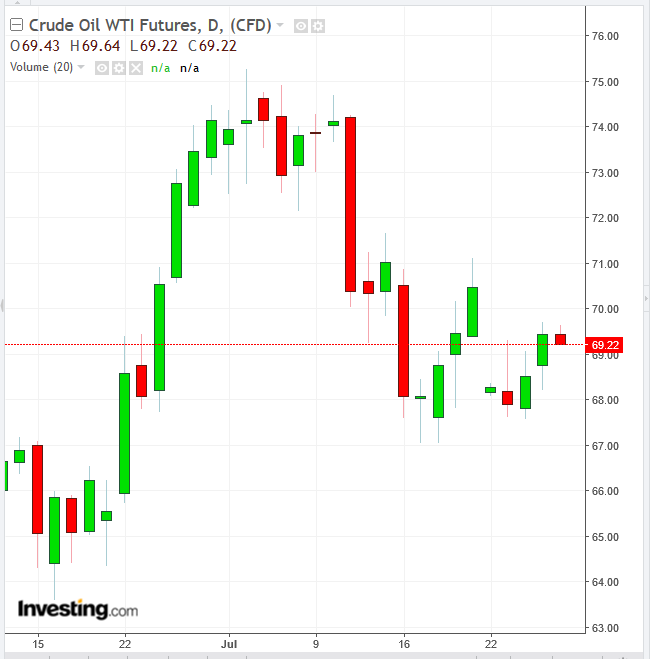- NASDAQ futures weighed down by Facebook plunge
- European shares buoyed by US-EU trade breakthrough
- Dollar fights to defend uptrend
Key Events
US futures were mixed on Thursday, with NASDAQ 100 contracts pointing to a lower open for the tech-heavy index after Facebook (NASDAQ:FB) stock crashed as much as 25 percent afterhours as the social media heavyweight reported a revenue miss along with lower daily active user counts in Europe.
The company also said revenue growth should decline by "high single-digit percentages from prior quarters" for the third and fourth quarter.
Meanwhile, news reports that US President Donald Trump and European Commission President Jean-Claude Juncker struck a compromise on lowering reciprocal trade tariffs yesterday in Washington, quashed investor fears over an all-out trade war and boosted European equities, after a mixed Asian session.
The pan-European STOXX 600 was lifted by industrials shares, the first beneficiaries of the US-EU diplomatic breakthrough. Nestlè (SIX:NESN) climbed as sales grew faster than expected while Royal Dutch Shell (LON:RDSa) stock slipped lower after the energy giant posted a profit miss.
The euro has been trading within a 20-pip holding-pattern for 13 hours ahead of the ECB interest rate decision.

While the single currency strengthened against the dollar on the de-escalation of transatlantic trade tensions, the Dollar Index has been on a knife edge since the news broke—technically, it is fighting to uphold the uptrend since May 14.
Earlier, during the Asian session, Japan’s TOPIX opened 0.76 percent higher, then swung to end slightly lower than its opening price at 0.7 percent, closing at a 5-week high on positive corporate results and easing trade worries.

Technically, the higher opening price formed a second consecutive rising gap, which was also the upside breakout of a bullish, falling flag. However, the low volume softens the bullishness of the breakaway gap, as the price retreated from the downtrend line since May 21. Finally, the closing near the opening price formed a High Wave candle—a marker of indecision that often shows up before a reversal or a correction. That would fit with a return move to the completed flag.
The Nikkei 225 was instead weighed down by reports that the Bank of Japan may stop buying exchange traded funds that track the index, in favor of those that follow broader equity benchmarks. It retreated 0.12 percent, giving up a 0.45 percent advance.
China's Shanghai Composite slipped 0.7 percent, for a combined two-day slide of 0.77 percent, amid worries that trade disruptions may hamper the country's economic growth. In stark contrast with the new-found spirit of cooperation with Europe, Trump accused China of targeting US farmers as leverage to obtain trade concessions.
Technically, today’s decline confirmed the bearishness of yesterday’s hanging man. However, it may be considered a profit-taking correction, rather than a reversal, after the strongest three-day rally since 2016 completed a Three Advancing White Soldiers pattern, thereby indicating reversing momentum on the mainland index. A break below the 2,800 level, where the uptrend line since the July 6 bottom meets, may signal a failure of the rally. The Three White Soldier support is 2,750.
Hong Kong's Hang Seng dropped 0.56 percent, after climbing 0.6 percent. Technically, the intraday high posted a false upside breakout of a bottom. South Korea's KOSPI climbed 0.2 percent and the won rallied 0.33 percent on optimism after the Trump-Juncker agreement, while Australia’s S&P/ASX 200 edged 0.05 percent lower.
Global Financial Affairs

On Wednesday, US equities leaped after the US-EU cease-fire. The S&P 500 jumped 0.91 percent, gaining ground for a third straight day. All 11 sectors posted gains, led by Industrials stocks (+1.52 percent). The leading benchmark reached within less than 1 percent away from its late-January record high.
The Dow Jones Industrial Average advanced 0.67 percent, to close at the highest level since February 26, extending the uptrend line since the March bottom.
Trump’s meeting with Juncker came amid a raft of mixed company results, some of which reflected the impact of recent trade headwinds. General Motors (NYSE:GM) shares plunged after the carmaker cut its profit forecast on surging metals prices, while Daimler (OTC:DMLRY) warned lower earnings at its Mercedes-Benz unit will extend into the third quarter because of higher trade barriers.

In other news, West Texas crude halted a two-day advance as it turned a 0.29 percent climb into a 0.30 percent slide, even after fresh data showed a decline in stockpiles.
Up Ahead
-
Earnings season continues:
-
Amazon.com (NASDAQ:AMZN), due Thursday after market close, $2.49 EPS forecast, VS $0.4 same quarter last year
-
Intel (NASDAQ:INTC), due Thursday, after market close, $0.99 EPS forecast, VS $0.72 same quarter last year
-
Twitter (NYSE:TWTR), due Friday before market open, $0.07 EPS forecast, VS $-0.02 same quarter last year
-
The European Central Bank’s policy decision is Thursday.
-
US gross domestic product, out on Friday,is forecast to have ticked 4.2 percent higher year-on-year in the second quarter, the most since 2014.
Market Moves
Stocks
-
The STOXX Europe 600 gained 0.5 percent, to the highest level in six weeks.
-
Futures on the S&P 500 fell 0.2 percent, the biggest fall in a week.
-
The UK’s FTSE 100 fell less than 0.05 percent.
-
Germany’s DAX jumped 1.5 percent.
-
The MSCI Emerging Market Index increased 0.2 percent.
-
The MSCI Asia Pacific Index gained 0.3 percent to the highest level in almost five weeks.
Currencies
-
The Dollar Index gained less than 0.1 percent.
-
The euro was unchanged at $1.1729.
-
The British pound increased 0.1 percent to $1.3198, the strongest in more than a week.
-
The Japanese yen gained 0.3 percent to 110.70 per dollar, reaching the strongest level in almost three weeks on its seventh straight advance.
Bonds
-
The yield on 10-year Treasuries dropped one basis point to 2.96 percent, the most substantial fall in a week.
-
Germany’s 10-year yield edged two basis points higher to 0.42 percent.
-
Britain’s 10-year yield climbed two basis points to 1.274 percent.
-
Italy’s 10-year yield gained two basis points to 2.701 percent.
Commodities
-
West Texas Intermediate crude climbed 0.2 percent to $69.47 a barrel, the highest level in almost two weeks.
-
Gold fell 0.1 percent to $1,229.90 an ounce.
